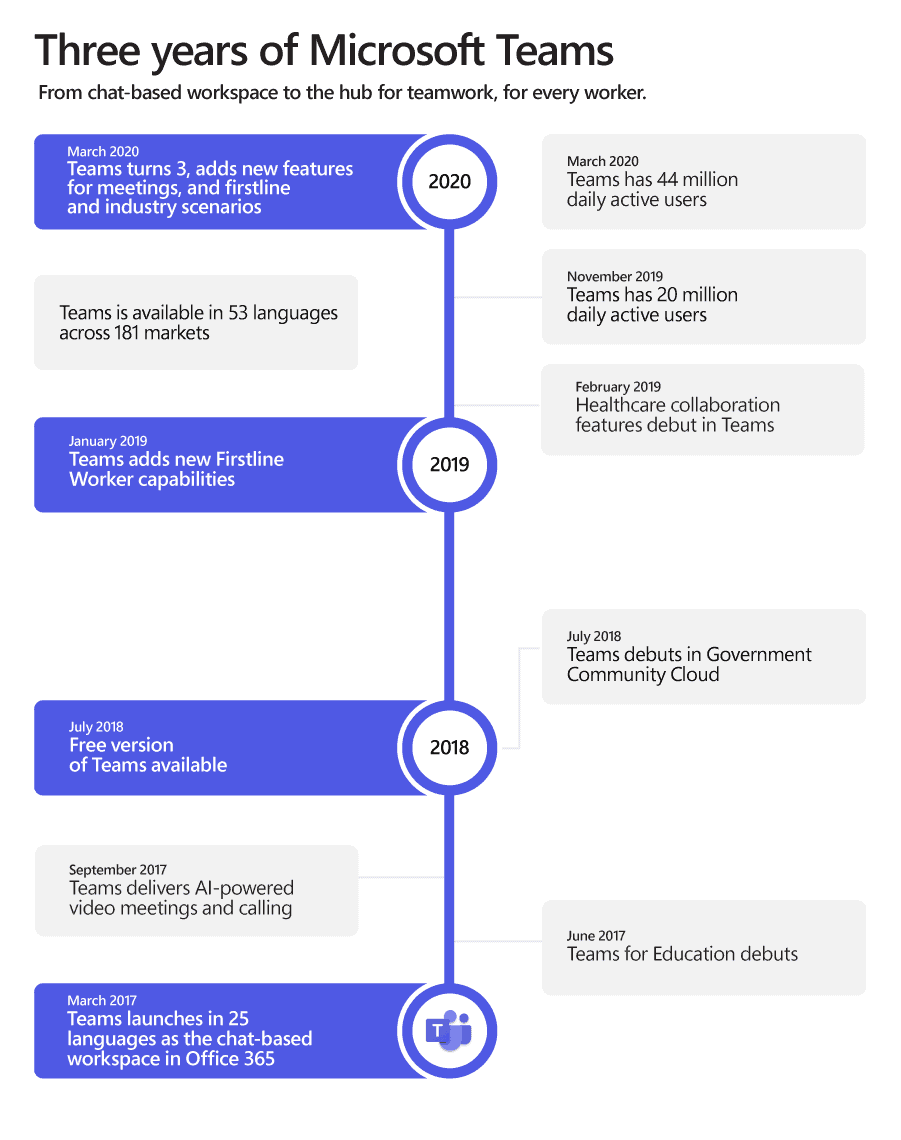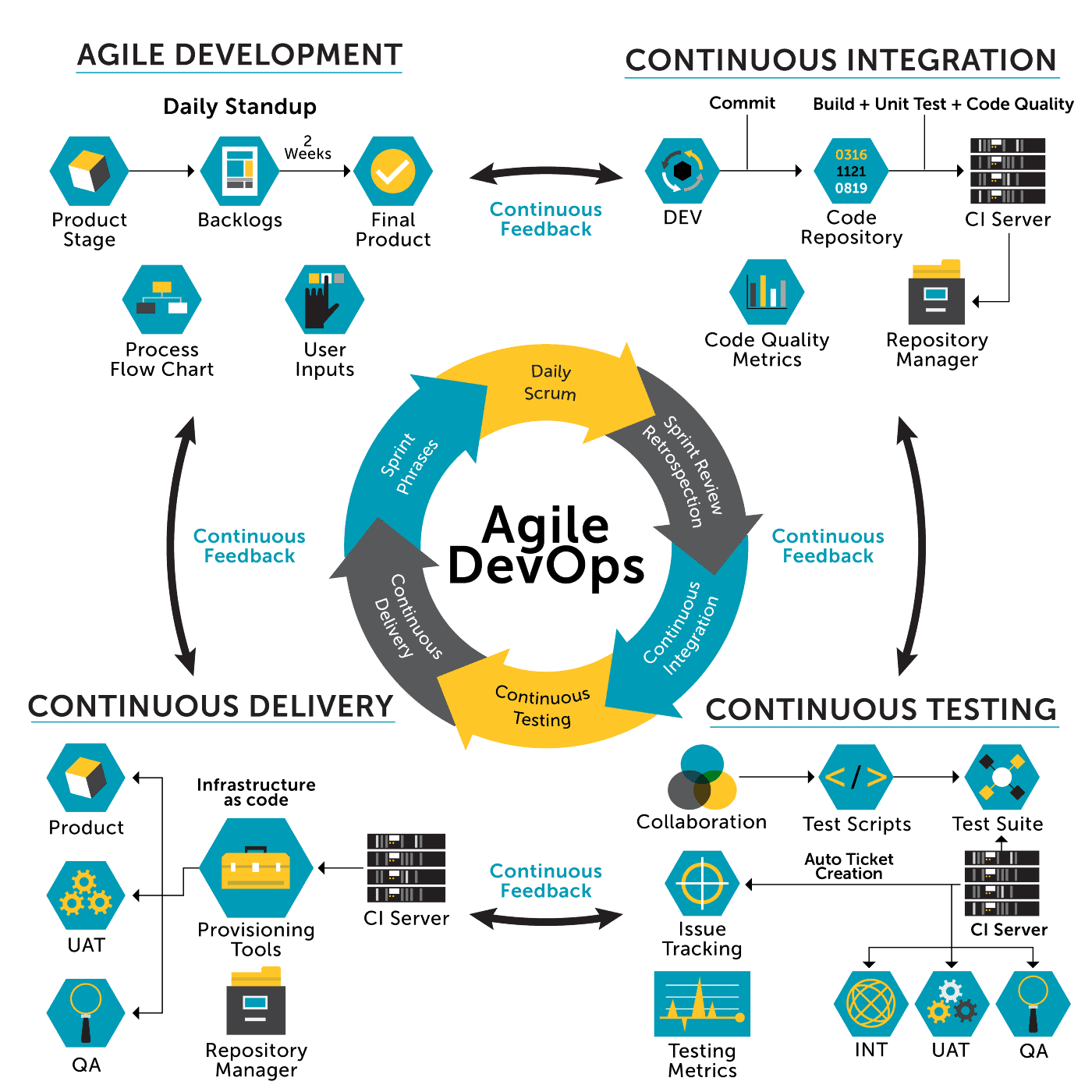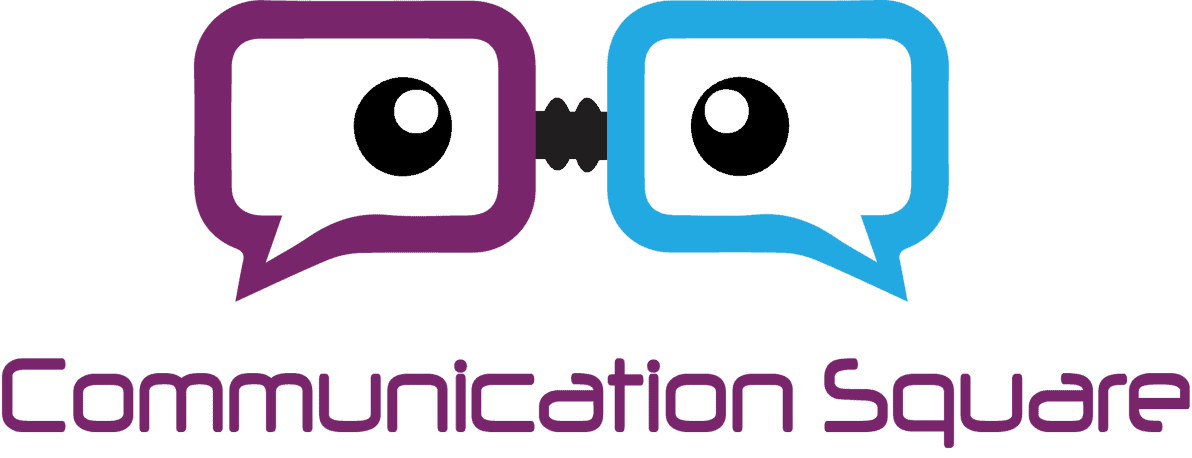Introduction
The necessity for successful collaboration in software development has never been stronger in the fast-expanding landscape of the fintech industry. Microsoft Teams collaboration software has become a widely utilized instrument for fintech engineers due to its vast potential to streamline communication and project management.
Starting with 2 million daily active users back in 2017, Microsoft Teams achieved an impressive rate of more than 270 million daily active users in 2022, and this tendency has a deep rationale behind it. More information about the Microsoft Teams background can be accessed via the following infographics:

Let’s review the necessities of advanced collaboration for fintech developers, explore core Microsoft Teams features, as well as discover the pros and cons of this collaboration software and its impact on Agile methodologies and DevOps practices.
Why Fintech Developers Require Advanced Collaboration
The fintech industry, with its intricate blend of technology and finance, inherently demands a heightened level of collaboration for success. Here's why:
Complex technologies: Fintech software development often integrates multiple cutting-edge technologies, from AI to blockchain, necessitating teams to collaboratively understand and implement them effectively.
Real-time demands: Many fintech solutions, like instant payment platforms, operate in real-time, underscoring the need for immediate team coordination and swift problem-solving.
Interdisciplinary nature: Fintech draws from various disciplines, including finance, technology, user experience, and more. Collaboration is paramount to bring these diverse perspectives together seamlessly.
Regulatory standard considerations: Given the financial nature of fintech, developers are expected to maintain strong compliance with HIPPA, GDPR, and other international and local standards that regulate customer data handling. This matter requires cross-collaboration between departments and external experts.
Security standard considerations: The sensitive financial data handled by fintech Solutions mandates the application of robust security measures. Collaborative input from multiple experts ensures comprehensive data protection.
The multifaceted nature of fintech development is both a challenge and an opportunity. That’s why it’s worth emphasizing the critical role of advanced Microsoft Teams collaboration tools or similar solutions in driving innovation and creating robust, compliant software applications.
Creating a high-performing software solution requires strong expertise, industry-best knowledge, and extensive experience in fintech software development. The right call for most businesses is to apply for assistance from an external service provider. A qualified team of financial software developers can help you get the maximum value from your investment.
The best thing about Microsoft Teams collaboration is when you’re partnering with an external fintech developer, you can expect seamless communication, timely feedback, and the ease of exchanging documents and information. Now, let’s dive deeper into the core technical features this collaboration software has to offer.
Core Features of Microsoft Teams Beneficial to Fintech Developers
Microsoft Teams has a suite of features tailored to meet the nuanced demands of fintech programmers. The most significant of them include:
Integrated Communication Channels
One of the standout capabilities of Microsoft Teams is its ability to merge chat, video conferencing, and file sharing into a unified platform. For fintech developers, this means that whether they're discussing code, highlighting a user interface design, or sharing a regulatory compliance document, everything can be done in a singular, secure space.
This integrated approach significantly streamlines the development process and fosters real-time decision-making.
If you’re considering Microsoft Team as your primary communication software, it’s likely that adopting Microsoft Teams Phone System — a cloud-based telephony solution will make a valuable impact on your business.
Seamless Integration with Microsoft Products
Fintech developers often rely upon various tools to design, test, and deploy their applications. Microsoft Teams seamlessly integrate with other Microsoft products such as Office, SharePoint, and Azure. This connectivity facilitates a smoother workflow and ensures that data transition and collaboration across different tools occur without hitches, enhancing productivity.
Advanced Security Features
Given the sensitive nature of financial data, security is paramount in fintech development. Microsoft Teams is built with advanced security features, including data encryption, multi-factor authentication, and compliance certifications. These features ensure that fintech programmers can collaborate with the assurance that their data and communication remain protected from potential breaches.
Microsoft Teams: Pros and Cons of the Collaboration Software
If you’re picking among a range of collaborative tools, you may be curious to know what Microsoft Teams’ benefits and limitations are relative to similar solutions in the industry. The pros of Microsoft Teams include the following:
Office 365 integration: With native integration to Office 365 apps such as Word, Excel, and PowerPoint, it enhances workflow efficiency as users can collaborate on documents without leaving the platform.
High-level security: Microsoft Teams boasts strong security measures like end-to-end encryption and multi-factor authentication, ensuring sensitive data remains protected.
Customizable workspace: Teams allow users to tailor their workspace with tabs, connectors, and extensions, making it adaptable to specific project needs.
Seamless integration with external apps: Beyond Office 365, Teams integrates with a plethora of third-party apps, expanding its utility and adaptability.
Guest access feature: Collaboration isn't restricted to internal teams; you can grant access to external partners or stakeholders, ensuring inclusivity in projects.
At the same time, the limitations of Microsoft Teams collaboration tools are:
Learning curve: For users unfamiliar with Microsoft's ecosystem, there might be an initial learning curve, potentially slowing down early adoption.
Occasional performance issues: Some users have reported occasional lags or performance drops, especially during large video conferences.
Complex notification system: While customizable, the notification settings can be overwhelming for inexperienced users, leading to missed messages or alerts.
Limited free version: The free version of Teams has limitations in terms of features, prompting businesses to upgrade for a fuller experience.
Challenging integration with non-Microsoft tools: While Teams integrate well with Microsoft products and many third-party apps, some non-Microsoft tools might not be as seamless, requiring workarounds.
Choosing Microsoft Teams as a collaboration software necessitates balancing these advantages and disadvantages. While it provides robust capabilities and integrations that might improve team collaboration, enterprises must also evaluate potential barriers to adoption and use.You may also be interested in reviewing the comparison of Microsoft Teams vs Google Meet from other blog post.
Enhancing Agile and DevOps with Microsoft Teams
Probably the major benefit of Microsoft Teams adoption is that it positively influences Agile philosophy and DevOps practices in place.
On one hand, Microsoft Teams, with its diverse communication and collaboration features, fits seamlessly into the Agile framework. Daily stand-ups, sprint planning, and retrospective meetings gain more structure and flexibility through Teams' video conferencing and integrated chat functionalities. Moreover, the platform's ability to integrate real-time feedback and document collaboration supports the iterative development and continuous improvement that Agile promotes.
On the other hand, DevOps, which emphasizes the integration of development and operations, finds a valuable contributor in Microsoft Teams. The platform's integration capabilities with tools like Azure DevOps and GitHub simplify the continuous integration/continuous deployment (CI/CD) pipeline. Fintech software developers and operation teams can swiftly address bottlenecks, track bug reports, and maintain real-time communication, ensuring smoother releases and faster issue resolution.
Moreover, with Microsoft Teams' seamless integration, a DevOps outsourcing agency can efficiently collaborate with fintech software developers and operations teams, streamlining the CI/CD pipeline and enhancing communication for smoother releases and rapid issue resolution.
You can familiarize yourself with the Agile DevOps overview from the infographic below. As shown, feedback, ensured through communication and collaboration, is paramount to the proper working of the system.

Final Take
Microsoft Teams collaboration software is easily one of the most rapidly spreading instruments for fintech developers worldwide. It fosters effective collaboration and seamless communication, which is the cornerstone of creating software solutions that can meet business needs and project objectives. Microsoft Teams, with its useful features, is also complementary to Agile and DevOps practices.
However, it’s worth keeping in mind the possible technology limitations to minimize their adverse impact on workflow. Given that, Microsoft Teams can be an irreplaceable instrument for diverse fintech teams.
Last Updated 5 months ago


